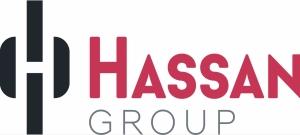09.09.15
Istanbul, Turkey
www.hassangroup.com
2015 Nonwovens Sales: $162 million
Plants
Istanbul and Tekirdag, Turkey
Processes
Web forming—drylaid (carded, airlaid), spunlaid/meltblown; Web bonding—thermal bonded (air through bonded/calender bonded, chemical bonded, resin bonded, mechanical bonded, needlepunched, stitch bonded
Brands
Hygenius (ADL), Polybond (SMS), Breatech, Autofelt, Class 4x4, Filtrex, Kundrax, Hasgeo
Major Markets
Hygiene and medical, automotive, ready-to-wear, technical textiles, white goods (isolation), filtration, footwear, construction (geotextiles), carpet (underlay), furniture and bedding, household (wipes), artificial leather backing
Sales at Hassan Group and its affiliated companies were about $162 million despite the impact of the strong U.S. dollar. The company makes 60,000 tons of nonwovens per year, with a range of 10-3000 gsm in cut sheets, rolls and die cuts.
Viteks, the first company of the group, made a recent investment to enable processing natural fibers for the automotive industry while Hassan, founded in 1985, added new needlepunch and extrusion coating capacity for the automotives industry. Telasis, founded in 1995, added carded elastic nonwovens in its product range. This type of nonwoven is mainly used by baby diaper elastic ear producers.
Merkas, founded in 2010, extended its air-through bonded and spooled nonwoven capacity and installed another air-through bonded line in the last quarter of 2015 for some other specific end uses in the hygiene industry. Aksis, founded in 2010, invested in a SMS line which is up and running.
The two young companies of the group, Merkas Inc. and Aksis, are experiencing positive growth while there is also an increase in the use of existing capacity in all companies in the group, Herkan Sisman says.
There are also other investments beyond nonwovens underway. The breathable film and laminates producer company Pelsan also made a new line investment to meet the increasing demand particularly in hygienic applications. In terms of regional operation, the group exports about 40% of its production.
www.hassangroup.com
2015 Nonwovens Sales: $162 million
Plants
Istanbul and Tekirdag, Turkey
Processes
Web forming—drylaid (carded, airlaid), spunlaid/meltblown; Web bonding—thermal bonded (air through bonded/calender bonded, chemical bonded, resin bonded, mechanical bonded, needlepunched, stitch bonded
Brands
Hygenius (ADL), Polybond (SMS), Breatech, Autofelt, Class 4x4, Filtrex, Kundrax, Hasgeo
Major Markets
Hygiene and medical, automotive, ready-to-wear, technical textiles, white goods (isolation), filtration, footwear, construction (geotextiles), carpet (underlay), furniture and bedding, household (wipes), artificial leather backing
Sales at Hassan Group and its affiliated companies were about $162 million despite the impact of the strong U.S. dollar. The company makes 60,000 tons of nonwovens per year, with a range of 10-3000 gsm in cut sheets, rolls and die cuts.
Viteks, the first company of the group, made a recent investment to enable processing natural fibers for the automotive industry while Hassan, founded in 1985, added new needlepunch and extrusion coating capacity for the automotives industry. Telasis, founded in 1995, added carded elastic nonwovens in its product range. This type of nonwoven is mainly used by baby diaper elastic ear producers.
Merkas, founded in 2010, extended its air-through bonded and spooled nonwoven capacity and installed another air-through bonded line in the last quarter of 2015 for some other specific end uses in the hygiene industry. Aksis, founded in 2010, invested in a SMS line which is up and running.
The two young companies of the group, Merkas Inc. and Aksis, are experiencing positive growth while there is also an increase in the use of existing capacity in all companies in the group, Herkan Sisman says.
There are also other investments beyond nonwovens underway. The breathable film and laminates producer company Pelsan also made a new line investment to meet the increasing demand particularly in hygienic applications. In terms of regional operation, the group exports about 40% of its production.


